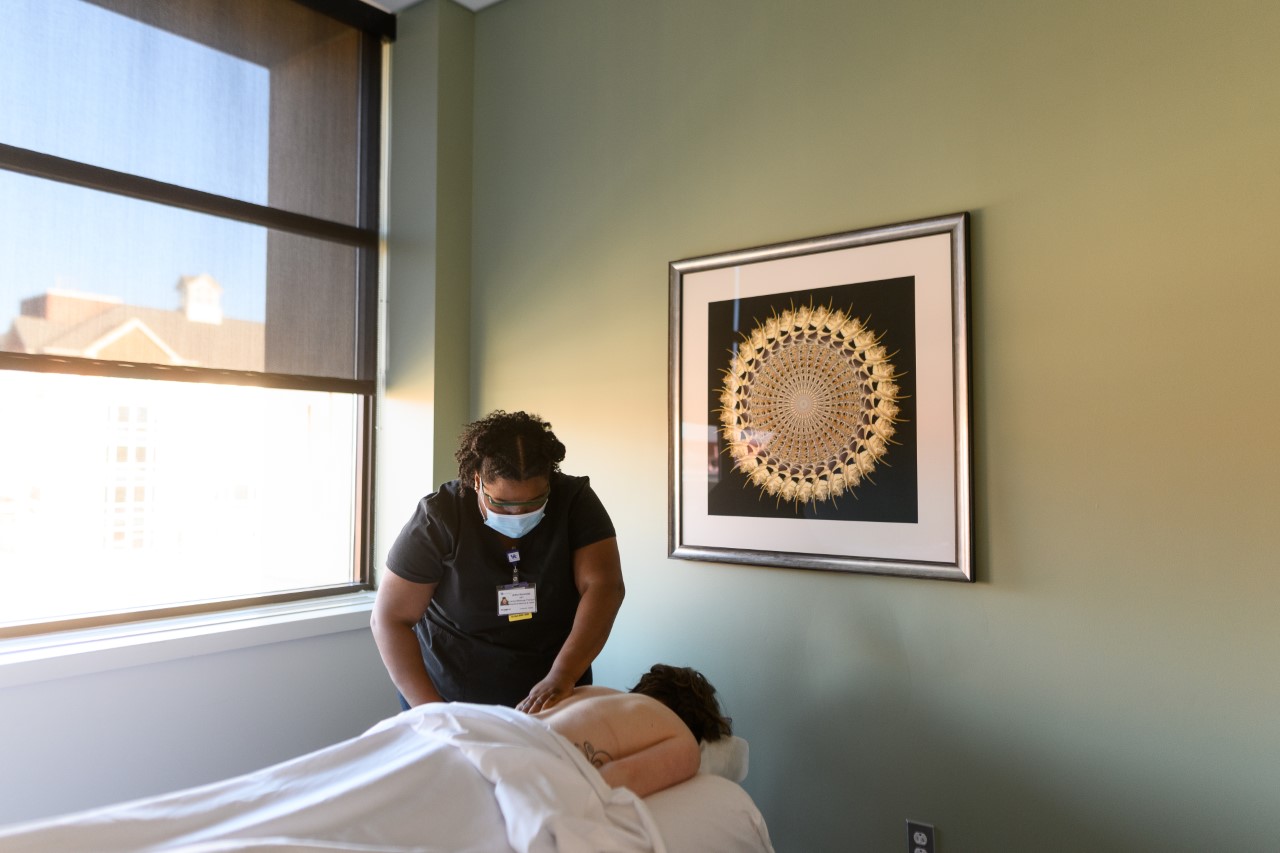Science says: Biophilia, your nose and visualization can help manage stress

Remember the “bread and milk” guy? (You can find the video on YouTube.) A winter storm is coming, and full of the-world-is-ending anxiety, he has to rush out to get the bread and milk.
That’s pandemic stress, all day, every day — for two years.
“I recently went to the dentist and they told me that they have seen more cracked teeth in the last two years than they have in their whole careers; they’ve also made more bite guards for people,” said Dr. Connie Jennings, medical director of UK Integrative Medicine and Health.
Along with increases in less common manifestations of stress, people also experienced the usual symptoms: more difficulty sleeping, appetite changes, increased caffeine and alcohol, less exercise and poor financial health. “We’re seeing some stress from people who had no idea they put so much on their credit card,” Jennings said. “There’s something about shopping online and looking forward to it coming in the mail that has a short-term soothing effect.”
Doctor’s advice: Biophilia
There are many ways to practice self-care.
One strategy that Jennings suggests requires some biophilia — literally “loving outside.”
There is a lot of emerging research about what many health professionals are calling “nature deficit disorder.”
Today being outside tends to be more of a treat, but it is actually essential to our well-being. Spending time in nature can have significant short- and long-term health benefits.
“Our brains evolved to be connected to blue sky and green grass,” Jennings said. “There’s a study where people spent three days out in nature, and they showed a 50 percent increase in their natural killer cell count. We all have these; they penetrate and destroy cancer cells and other foreign invaders. A month later, these people weren’t spending that extended time outside anymore, but the cells were still 23 percent over their baseline count. That’s real medicine; that’s like an infusion or a pill.”
Doctor’s advice: Find what works for you
In addition to getting outside, regular exercise can mitigate stress. Even better? Exercising outside. Walking is a great option and offers a good dose of nature’s medicine. Jennings found solace and respite in exploring Lexington on foot during the pandemic. “I really had a good time, and I found places I didn’t know existed; and I’ve been here a long time,” she said.
It is also a safe way to socialize or even host work meetings. “It’s amazing how much you can get done,” Jennings said. “Generally, people are happier, they get along better and they’re more likely to work as a team. And I think walking outside helps generate more creative thoughts.”
For gym-goers who are still wary (understandably) about returning to indoor and group fitness offerings, fortunately there are many YouTube videos and mobile apps that make it easy and motivating to practice self-care. “Psychologists have shown that apps for exercise and meditation work, so find one that suits your taste,” Jennings said.
Doctor’s advice: Follow your nose
Jennings, and science, are also avid supporters of aromatherapy with essential oils as yet another stress management tool.
“The olfactory sense is the oldest neuronal pathway we have in our brains,” Jennings said. “We smell something, and it goes directly to the limbic system, one of the oldest parts of our brain. The signals from the limbic system generate emotion.
“People who work out in pine forests report a 30 percent increase in energy levels,” she added. “Science has shown that people who exercise in cedar forests after it rains have lower blood pressure. Scents help people sleep too. If you like lavender, you can put a couple drops on the soles of your feet at night for a more restful sleep.”
Doctor’s advice: Take advantage of our Integrative Medicine and Health Clinic
In addition to aromatherapy, the UK Integrative Medicine and Health Clinic offers many alternative therapies to help manage stress and promote physical, mental and emotional well-being, including massage, narrative medicine, acupuncture, reiki and yoga.
“Humans were made for yoga; it can be an exercise, it can be breathwork and it can be a meditation,” said Jennings, who added that it also stretches the body’s fascia and boosts white blood cells. “The fascia is like a sheet of cheesecloth that runs from the top of the head to the bottom of the feet. When it’s stretched in yoga, it stimulates the white blood cells to eat up anything that doesn’t belong.”
Meditation is also a great option, and science supports its health benefits as well. “We know that people who meditate regularly were found to make more antibodies to the flu vaccine, providing more protection,” Jennings said. “Meditators are found to have lower levels of inflammatory markers and less inflammation in general. They also have lower levels of stress hormones, which decreases the chances of heart attack and stroke.”
You can also try narrative medicine. In this structured form of journaling, participants use writing prompts to reconstruct difficult life experiences in a way that helps them find meaning in these events, regardless of their outcomes.
If you’re feeling like the “bread and milk” guy, you’re not alone. Fortunately, there are many options to bring on the calm. The first step is to “stop and listen,” Jennings said. “The best doctor we have is the body. It knows when we need to move or eat or sleep, and when we need to be still and focus inward. We just have to stop and listen for that voice.”
For more information, visit the UK HealthCare Integrative Medicine & Health web page here, or contact us by calling 859-323-4325 or emailing ukintegrativemedicine@uky.edu.




